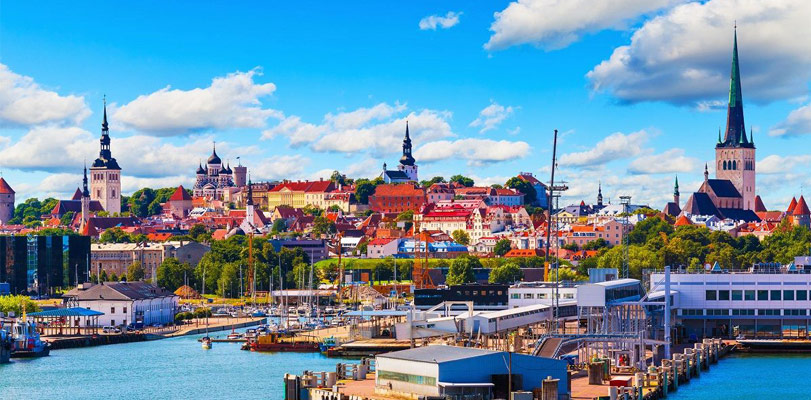“A new digital nation for global citizens, powered by the Republic of Estonia.” That’s the official definition of the Estonian e-Residency programme – a world first, from a country so technologically forward-thinking that it’s nicknamed E-Stonia.
As of November 2017, there are nearly 25,000 Estonian e-Residents from 151 countries. Finland boasts the most with over 3,000 applicants, followed by Russia, Ukraine, the US, and the UK.
But what does digital residency actually mean? What do you get as an Estonian e-Resident? Are there any limitations to the programme, and if so, what options might you consider instead?
Breaking down the Estonian e-Residency programme
So, what actually is a new digital nation for global citizens? According to the Estonian government, their e-Residency programme is a government-issued secure digital identity that anyone worldwide can hold.
Estonian e-Residents get a digital ID card that gives secure access to e-services to incorporate and manage a business online. It’s a fantastic solution for digital businesspeople who don’t want to be tied to a location. The e-Residency programme is an extension of Estonia’s existing e-identity programme, which Estonian citizens have been using for over a decade. Now the government has launched globally in “public beta phase”.
How do you get Estonian e-Residency?
The process is simple. You need a photocopy of your identity document, a passport-style digital photo, and a short motivation statement explaining why you’re interested in Estonian e-Residency.
You submit these through the secure online portal and pay a fee of EUR 100 and then a background check is conducted, which should take around 10 working days. Then you can pick up your digital ID card in-person from any Estonian embassy or consulate in 35 countries worldwide, or from the police or Border Guard service points in Estonia. The whole process usually takes around one month.
So let’s see if the programme could be a good fit for you.
Advantages of the Estonian e-Residency programme
As an Estonian e-Resident you can establish and manage a company completely online using the e-services unlocked with your secure digital ID card.
You can also conduct secure online banking and get secure access to international online payment providers such as PayPal. Plus, you don’t need a local director or representative – you can be the full owner of your company, maintaining complete control over your affairs.
Managing your business online is made simple as you can use your digital e-card to sign and authenticate documents very securely, from anywhere. You can also encrypt and scan documents securely, removing a major headache for international businesspeople. The digital ID stands as legal equivalent to signature and in-person identification amongst agreed partners, so it removes a huge amount of hassle from the international business process.
Your Estonian e-Residency card also allows you to declare Estonian taxes online through the e-services portal. Companies incorporated in Estonia are usually considered tax resident in Estonia, and are subject to highly competitive Estonian corporate tax rates at 21%.
Estonia also holds various international tax treaties which can override national law and grant tax relief. If you manage your company from elsewhere and don’t have a permanent business presence in Estonia or Estonian-sourced income, you can usually claim exemption from Estonian tax. Or you might choose to manage from Estonia, which would enable you to create a foreign permanent establishment to take advantage of tax treaties. The point is, the setup is adaptable to your specific requirements.
In all, the major benefit of Estonian e-Residency is the ability for business owners to become location-independent. You can operate your business remotely, from anywhere in the world, and don’t need to re-incorporate if you move.
Essentially, e-Residency is a passport to easier international business, which makes it a fantastic acquisition for many. But it does have its limitations.
Limitations of the Estonian e-Residency programme
Whether the e-Residency programme suits you really depends on your requirements. If your primary concern is business freedom this could work well, but if you’re looking for a more traditional residency or citizenship deal this probably won’t tick your boxes. The programme facilitates greater global mobility, but it doesn’t give you greater freedom of movement.
In other words, the Estonian e-Residency programme does not offer citizenship, personal tax residency, a residence permit or rights of entry either to Estonia or the EU. An Estonian e-Resident definitely isn’t an Estonian resident, in other words.
There’s also a potential cyber-security concern. Although every measure has been taken to ensure total security, any digital solution is at risk from cyber-crime. If your business is highly sensitive, this is something to consider.
Also, the e-Residency programme is still arguably best suited to anyone who has business in or does business from Estonia. The digital ID is legal equivalent to a signature throughout Estonia but only currently worldwide amongst select partners. The global application of the card is questionable.
Saying that, the Estonian government is transparent that the programme is a work-in-progress. They’re working to improve and add services for e-Residents that will continue to make the lives of international businesspeople even easier. If your main priority is increased business mobility, e-Residency is almost certainly worth having.
What are the other options for international businesspeople?
So let’s widen out our search, because if you’re looking for solutions that make your personal and business life easier, Estonian e-Residency is just one option. Digital residency is an intriguing idea, but if you have the means to invest you could secure a more comprehensive deal that gives you – and your family – physical residency or citizenship.
This would entitle you to physically live and do business from the country in question and, in the case of citizenship-by-investment programmes, you also get a new passport.
Top 3 citizenship-by-investment programmes in Europe
Let’s look briefly at the top programmes in Europe – usually better for global mobility – and the Caribbean – offering extravagant tax benefits.
Portuguese golden visa programme: Travel visa-free across the Schengen zone, which includes much of Europe. Investment from EUR 350,000 into real estate, with other options available. You can potentially naturalise as a full Portuguese citizen after six years too, which would allow travel to around 170 countries on visa-free or visa-on-arrival terms.
Cypriot citizenship-by-investment programme: Travel to nearly 160 countries on visa-free or visa-on-arrival terms on the passport ranked 16th in the world. Favourable tax rates and incredible quality of life in the heart of Europe, within only two months. You’re looking at an investment of EUR 2m for this exclusive programme.
Bulgarian citizenship-by-investment programme: Follows the same residency-then-citizenship path as Portugal, but with an optional fast-track option. Gain citizenship within one year for a total investment of EUR 1,000,000 and get visa-free or visa-on-arrival access to 150+ countries.
Top 3 citizenship-by-investment programmes in the Caribbean
Outside of Europe, here are three of the best in the beautiful Caribbean.
St. Kitts and Nevis citizenship-by-investment programme: This is the oldest citizenship programme, established in 1984. One of the most popular citizenship options amongst the international community, unlocking 135+ countries on visa-free or visa-on-arrival terms and offering significant tax advantages. Investment starts from USD 150,000 non-refundable.
Grenadian citizenship-by-investment programme: One of the fastest programmes, you can secure citizenship here in only 60 days. A Grenadian passport unlocks over 120 countries on hassle-free terms including the Republic of China, and allows you to apply for the coveted US E2 Investor Visa from the United States. Plus you benefit from considerable tax advantages. Investment in Grenada starts from USD 200,000 non-refundable or USD 350,000 into real estate.
Dominican citizenship-by-investment programme: Very cost-effective option, with investment starting from USD 100,000 non-refundable or USD 200,000 into real estate. Some developers offer up to 8% guaranteed annual returns while others offer up to 75% financing. Again, very favourable tax conditions from this internationally-renowned tax haven, plus hassle-free travel to around 120 countries.
Is the Estonian e-Residency programme for you?
Estonian e-Residency is a step in the right direction for international businesspeople. Becoming location-independent means limiting bureaucracy: no bad thing.
It also potentially brings some tax advantages, depending on corporate tax rates and international tax treaties in your home country. It’s a passport to set up business in Estonia without holding physical EU citizenship, which could prove lucrative. And there are no real disadvantages to e-Residency – especially given the nominal cost.
For wider reaching benefits, though, there might be better alternatives. If you have the financial means, astute investment could take you beyond digital residency into physical residency or citizenship.
So if you’re looking to broaden your personal and professional freedoms in every area of your life, you might find the Estonian e-Residency programme doesn’t go far enough.
Next Generation Equity is a government-approved provider of second citizenship and residency programmes tailored to the individual needs of discerning clients across the globe. To learn more about our programmes, please sign up for a free consultation via the form below.





